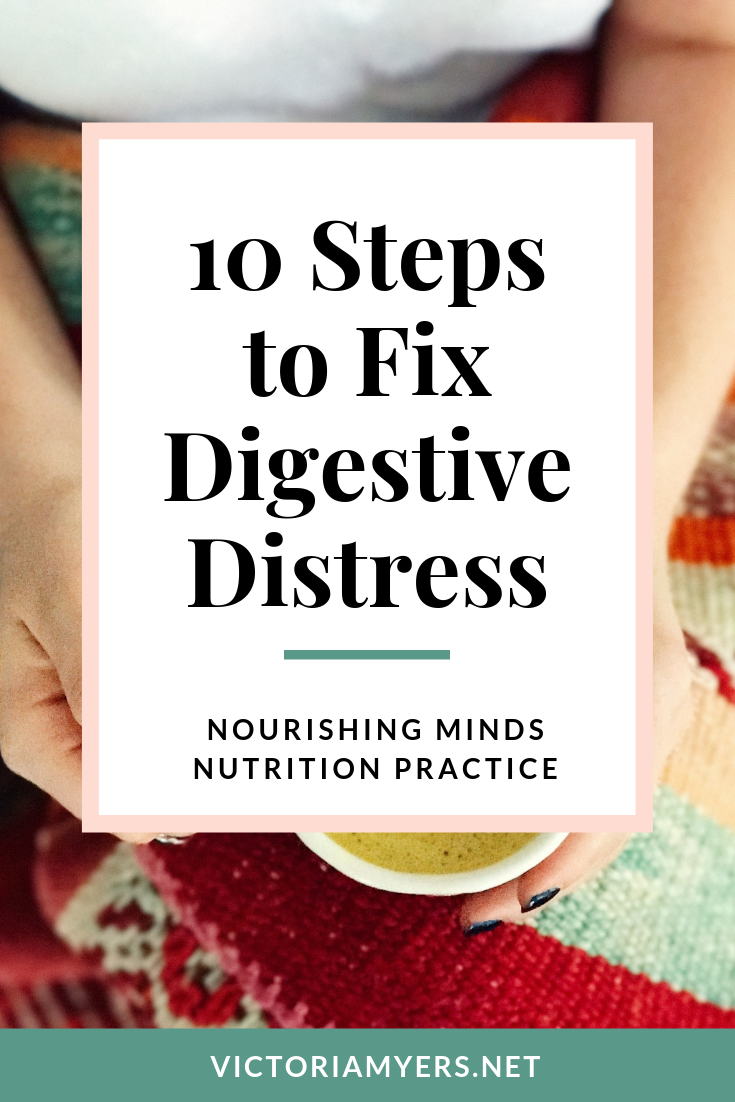10 Steps to Take to Fix Digestive Distress
By: Megan Perez, dietitian at Nourishing Minds Nutrition
Are you someone who regularly experiences IBS symptoms, heartburn, nausea, or indigestion? If so, do you also find yourself feeling overly anxious, depressed, or even dizzy? A majority of our clients at Nourishing Minds Nutrition are suffering from some type of digestive distress in addition to disordered eating when they begin working with us. Whether it’s chronic bloating or chronic fatigue, I find that it is almost always linked to the gut-brain connection.
The gut is often referred to as the second brain, and it even has its own nervous system called the enteric nervous system (ENS). Our gut, which primarily consists of our stomach, small intestine, and large intestine, is connected to our brain by a bundle of nerves called the vagus nerve. This nerve is similar to a telephone cord and runs all the way from the colon to the brain stem. It is responsible for several functions including both sensing information and stimulating muscle contractions along the digestive tract. The vagus nerve also plays a role in managing heart rate, blood pressure, and even speaking.
Your gut and your brain talk to each other, all day, every day via different pathways, however; your vagus nerve is the fastest and most important route. Ninety percent of this signaling travels from the gut to the brain, while just ten percent travels in the opposite direction, from the brain to the gut. The sensors in your gut inform your ENS about everything it needs to know in order to ensure proper digestion. This information could include the strength and direction of the gut’s peristalsis, the amount of stomach acid and bile produced after a meal, the size and consistency of the food you swallow, and even the activity of your gut microbes. These sensors can additionally detect the presence of parasites, viruses, and toxins.
This sensory information is also sent to the brain via the vagus nerve. A “healthy” gut does not report minor, unimportant digestive information to the brain. It will only send the most vital information to the thalamus in the brain for further processing. When the brain identifies a serious stressor (such as anger or anxiety), it requires extra energy in order to address it. This extra energy is pulled from the gut, slowing or preventing the gut from doing routine jobs like digesting food. The digestive system resumes once the brain has addressed the stressor and the emotion has passed. The brain sends two different types of nerve signals to the gut: those that stimulate function and those that inhibit function.
If you are a regular listener of the Nourishing Women Podcast, you know that we talk about these mechanisms a lot, but you may not be familiar with the vagus nerve. So, how do you know if something is wrong with your vagus nerve? Because this nerve plays a role in most of our body’s functions, there is no specific checklist for determining the health of your vagus nerve. In fact, worrying about your vagus nerve health may cause more damage! That being said, if you are experiencing any of the following symptoms, you could possibly have nerve damage: IBS, depression, anxiety, chronic fatigue, high or low heart rate, difficulty swallowing, gastroparesis, heart burn, dizziness, fainting, or B12 deficiency. Again, the point of this article is not to cause worry, but instead, it is to empower you to start taking steps towards improving any of these symptoms. Disclaimer: Experiencing some of these symptoms occasionally is completely normal. There is no such thing as “perfect” digestion or experiencing only happiness.
Since the vagus nerve is associated with many different functions and brain regions, research shows the positive effects of vagal stimulation on a variety of conditions such as the ones mentioned above. Vagal stimulation may help improve anxiety disorders, migraines, addiction and eating disorders, mood disorders, and digestive issues. There are many ways to stimulate the vagus nerve, and here are a few of my favorites:
Deep and slow breathing: For the average adult, breathing around 5-6 breaths per minute can be beneficial.
Laughing: It’s the best medicine!
Singing or chanting: Energetic, loud, and upbeat singing is recommended!
Yoga: Shown to improve mood and decrease anxiety.
Meditation: “Loving-kindness” meditation increases vagal tone.
Gargling: Contracts the muscles in back of the throat.
Acupuncture: Traditional acupuncture can stimulate the vagus nerve on the ears.
Positive relationships: Social connection increases happiness and our sense of belonging.
Mild exercise: Stimulates gut flow. Warning - intense exercise can inhibit gut flow.
Cold exposure: Splash cold water on your face or try taking a cold shower.
All of the above strategies have been studied to activate a relaxation response, shutting off the “fight or flight” reflex. The best part is that most of these are easily accessible and free! I highly recommend picking one or two techniques to work on for a short period of time daily if you are experiencing any of the symptoms associated with a damaged vagus nerve. It may take some time before you feel improvements or relief, but in the short term you should feel more positive and loving towards yourself. Seems like a win-win to me!
Thank you Megan for this wonderful article! You can learn more about Megan and learn about working with Megan over at Nourishing Minds Nutrition.
Want to learn more about digestion? We have covered the topic extensively on the Nourishing Women Podcast! Some of my favorite episodes are:
Episode 64: Probiotics 101: the what, the why and the how
Episode 66: SIBO, IBS and Digestive Healing with Kelsey Kinney, RD, MS
Episode 83: Digestive Basics, IBS/SIBO & Merging Intuitive Eating with Digestive Healing
Episode 84: Fermentation and the Tradition behind Fermentation Foods with Sarah Arrazola
Episode 100: Disordered Eating as Root Cause to Digestive Issues with Kelsey Pukala RD/N
And some of my favorite blog posts on the topic are:
Is Clean Eating Causing Your Digestive Issues?
Healing Disordered Eating and Digestion Together
Why I Stopped Drinking Smoothies Everyday
Improve Your Digestion Naturally (And Start Today!)
If you want extra support in connecting with your body, sign up for our FREE mini-course. The Summer Reset is a free mini-course created for you to help you realize this fact: you’re already summer body ready. And what this means to you is, instead of constantly trying to change your body every year summer rolls around, you can choose to reset how you view your body. So you can feel comfortable and gain confidence in the body you have right here, right now. The Summer Reset will help you reset your mindset towards food, fitness and body this summer so you can stop waiting and start LIVING NOW.
Resources for you:
Learn more about our services at Nourishing Minds Nutrition. Read testimonials from our amazing clients here.
Join our FREE support group for like-minded women, the Nourishing Women Community for more community & support.
Take a look at our online shop, the Wellness Without Obsession Shop.
Let’s hang out! Connect with Victoria and the staff at NMN:







